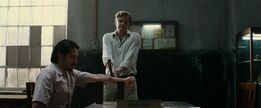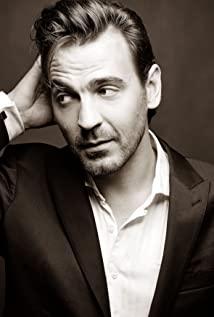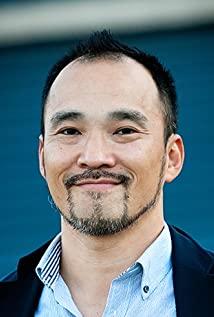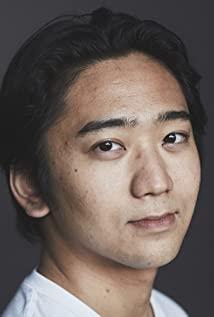Moreover, after reading it, I don't know why these four old bones are here.
As usual, sort out the thin plot: the protagonist liked railways and trains a lot during World War II. When he was a soldier, he was arrested by neon soldiers to repair the railway, and then he was tortured because of his own radio. A few years later, I found a wife on the train. After the marriage, the wife found that the protagonist was still in PTSD (Post Traumatic Stress Disorder) and was unable to extricate herself. She turned to the protagonist’s old comrades for help, and then the old comrades finished telling the story and committed suicide with the protagonist. , The protagonist set off to find Neon Soldier to settle the account. After one vent, the two exchanged letters and became close friends.
Although this film is adapted from a true and real autobiography, it seems that it is sponsored by the Australian government, but from the concept to the production, it reveals the sour smell of old British pedantic ideas everywhere.
Prisoner-of-war films, or extended to the scope of war films, if they are not for justice, they must be reflecting on the war itself. This is not because this angle is conventional and easy to expand, but because of the nature of war. To briefly list, "The Great Escape", "War Apocalypse", "Black Hawk Down", "Field Platoon", "Save the Soldier", "Schindler's List", "Pianist", and the classics mentioned in the title "The River Kwai" "Bridge" will never and never dare to jump around on both sides of the war, let alone obscure the cruel and violent nature of the war behavior itself because the focus is on the individual.
Because the war is not about two children fighting (although it may be caused by children fighting), turn your head and say sorry and hand in hand as good friends, especially when the status and strength of the two sides are not equal, and one side bullies the other unilaterally. In the case of one party, even if the attacker is really sorry in the future, the victim will find it difficult to forgive (of course, on the one hand, it reflects the value of understanding, on the other hand, it actually involves more psychological behaviors).
If you can say that the past is just as magnanimous as the protagonist of the film, and you can also become friends hand in hand, I'm afraid it really has some psychological problems. Of course, how is the real story, it is not convenient to evaluate. But for the Stockholm syndrome patient shown in the movie, not only is there a problem with emotional intelligence, but also with worrying IQ.
A brief look at the dry and mediocre resume of the director of the film will give you a general understanding of the quality of the film. The scenes are mostly indoors, and the outdoor scenes should also be scaffolding and post-production. Although the pictures are beautiful, they are not fresh. Chaotic rhythm is also a major drawback, especially for movies that jump around in different time periods. It is necessary to pay more attention to the balance between time and plot. It is precisely because of this deficiency that the empress and the old man of the Si family are in The first 5/7 have become soy sauce foils, with no acting skills or opportunity to appear: the appearance of the old man of the Si family before suicide turned out to be the longest time in the film; Nicole's line does not exceed 5 each time. Sentence, before the marriage, everyone has a lot of bitterness after marriage; the colin actor perfectly interpreted a suspected mental patient from beginning to end, and he was full of emotions from beginning to end. When he vented, he kept half a breath, so I can’t wait to help him. The most innocent General Guangming really looks innocent. His enemies are extremely confused when they meet, and they cry in his hand, and the road to Hollywood with a fierce face is much harder to walk than Ken Watanabe. The latter has long entered a positive role, and the former is still making a big show of bullying the younger generation with "Ruroin 47" and "Wolverine 2".
Let's look at the plot again: after the marriage, the movie king discovered that the actor had PTSD. Not only did he slept unfaithfully, he was also a negative Virgo, and he had to restore the cleaned study to its original state. This passage may be to show the depth and pain of PTSD's hatred, but the final effect is like promoting cohabitation before marriage; the old man Sijia collected materials of the neon soldier for the protagonist, because he was not tortured back then. Suffering, I want the actor to retaliate and vent back to repay the resentment they share. But the actor's words immediately made the old man speechless. I don’t know if the subsequent suicide was because of this:
"If I wanted to go to him in the early years to settle accounts, but now we are all in all walks of life, we are married and have children. Appropriate." What's
wrong is that you are not the old man, okay? Did you get PTSD at home, okay? The old man kindly persuades you, your wife kindly asks the old man to enlighten him, what's the reason for being ridiculed by you?
Then the old man committed suicide sadly.
In fact, General Guangming was not a professional tortured back then, just a translator. I have never done it myself (at least in the film). At most, I knew that I did not report the delay of the torture. After the war, he claimed that he had not participated in the torture, so he escaped the death penalty of war criminals, but was sentenced to community labor (by mistake) along the railway. He cleaned up the dead body and came back to purify the soul after being stimulated for many years. As a result, he encountered the protagonist Wanli seeking revenge. He was tortured inexplicably and logically. Finally, she cried and wrote a letter. The empress group once again came to Vietnam to visit her friends. .
The reason why the protagonist was tortured was because he built a radio to listen to the radio, which was later discovered. However, the Neon Soldier is very brain-dead (and the protagonist in the film is utterly spit out, it is definitely a death, this character is definitely a character defect) thinks that this radio can still be used as a transmitter, a telegraph, and a machine.
So there was a torture.
The Neon Soldier wants to know what news the protagonist has heard. The protagonist did not say that he died.
So there was another waterboarding.
I couldn't stand it anymore, and said:
"Neon has almost stopped cooking, and the bombing is finished, and I just wait to surrender."
After finishing speaking, he looked at the neon soldier's trembling expression and said arrogantly:
" Sooner or later, you will know, wait for the surrender."
So he called again.
This kind of personality is very problematic, and it has a tendency to tremble. Although he has been captive and has suffered from PTSD for many years, he can still be magnanimous with a superior attitude. The two sentences understand the double torment of the spirit and the body. The thing is really only the British can do it.
If you don’t believe me, just look back and look at "The Bridge on the River Kwai", which is also building a railway:
In 1943, the dark clouds of war enveloped the Pacific, and there was an allied prisoner-of-war camp on the border of Burma under Japanese occupation. Out of strategic needs, the Japanese army built a bridge for the Thai-Burmese railway on the river Kwai on the border between Burma and Thailand, and a prisoner-of-war camp. Naga Saito Daisuke ordered all prisoners of war to participate in the construction of the bridge, but Colonel Nicholson, the representative of the British prisoners of war, believed that this violated the Geneva Convention and refused to implement it. The two sides confronted each other, and later the two sides had a dispute over the treatment of prisoners of war. Nicholson was imprisoned. Confinement room. The prisoners of war who had participated in the construction of the bridge began to slow down. Coupled with the insufficiency of the Japanese design, the entire project came to a halt. Saito had no choice but to make concessions. Nicholson and others were released. At this time, the US prisoners of war Shields The major successfully escaped from the prisoner-of-war camp and came to the British assault force in the border countryside. Shields accepted the task of blowing up the River Kwai Bridge from the captain, Major Wharton. The two men, led by a few Thais, sneaked into the bridge construction site. Nearby Nicholson thought after his release: Why not do something in the war that destroys everything. So he led the prisoners to work day and night, and the bridge construction went on smoothly. Three months later, the bridge was built. Shields He cleverly placed explosives on the bridge piers. On the day when the bridge was opened to traffic, Nicosen made a final inspection of the upper and lower parts of the bridge and suddenly found a detonating wire buried in the sand bed. He had a battle with Shields. The Japanese guards were in a hurry. The fire hit the explosives. After a few loud noises, the River Kwai Bridge was blown up, and the fast-moving train also crashed into the river. Nicholson and others died heroically. I
won’t talk about the latter’s intentions here . And the main point. Purely from the understanding of the British, at least they are quite consistent.
This is really a problem.
http://i.mtime.com/cydenylau/blog/7777666/
View more about The Railway Man reviews











